
|
Major headlines have recently reported on Portugal’s decision to outlaw after-work contact from employers to employees. France already implemented this law, specifically with emails. All of this has been in the name of the worker and helping to promote a healthier work-life balance. But, what about the U.S., the single most overworked developed nation in the world? Do their employees want the same rights?
We let the evidence do the talking by speaking directly to 1,000 employed Americans. We asked them how often they’re currently being contacted outside of work, how they typically respond, and how it impacts their life. We also asked their opinions on making this type of after-work contact illegal and what they felt the punishment should be. If you’re curious to see how this hardworking country feels about these new pushes for work-life balance, keep reading.
Our study begins with a simple question: Should after-hours communication from employers to employees be legal?
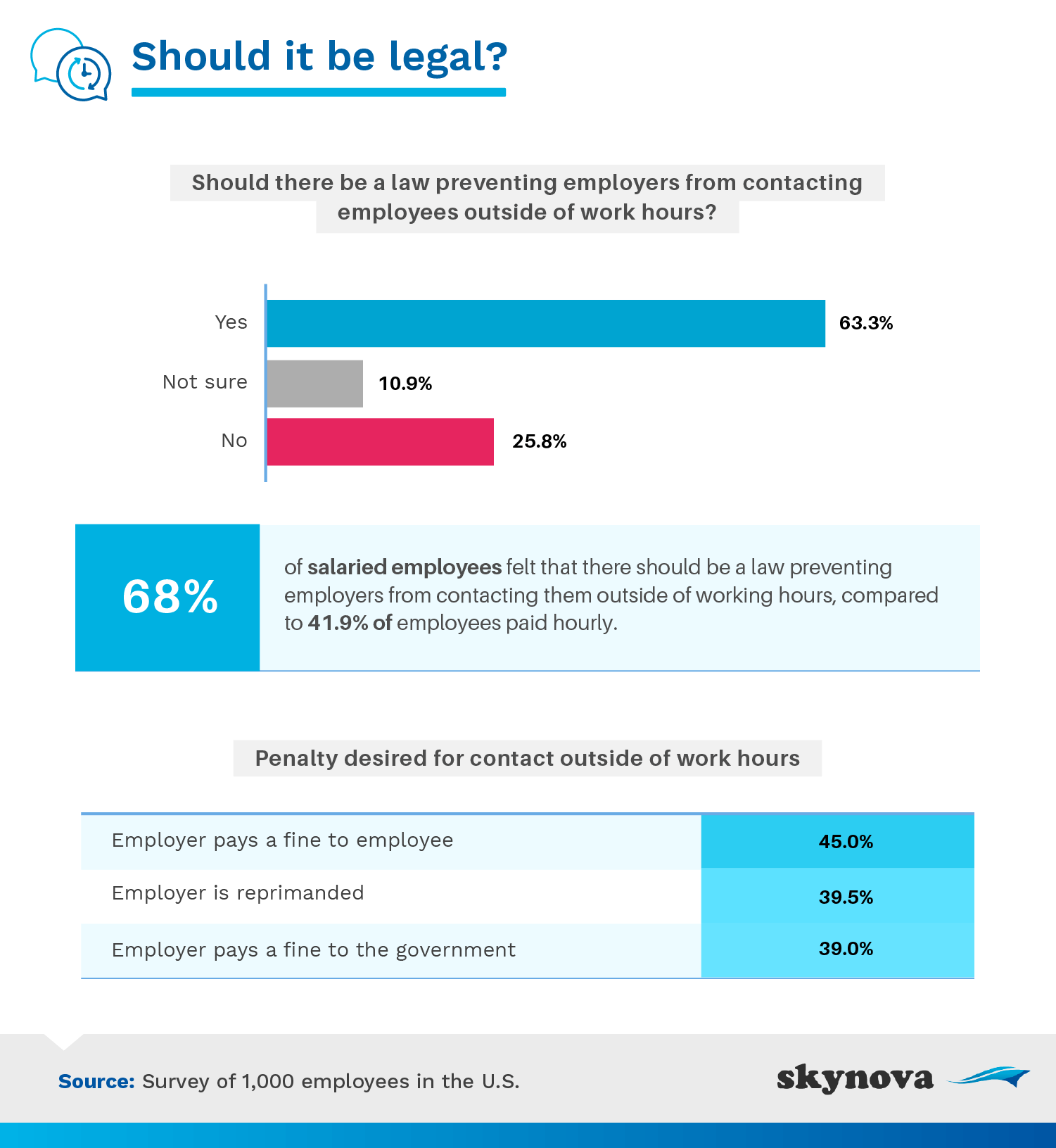
The clear majority (63.3%) of employees in the U.S. favored a law preventing employers from contacting their employees after work hours and expecting a response. This supporting group became even larger when they were salaried, as opposed to hourly workers. Presumably, hourly workers would possibly receive compensation for this additional time. Those who were less likely to support these types of laws were most often baby boomers, roughly half of whom felt that it was an employer’s right to contact them outside of working hours.
Where penalties for breaking this hypothetical law were concerned, most people felt the employer should have to pay a fine directly to the employee. In essence, this is comparable to being paid overtime. By comparison, 39% wanted the employer to pay the fine directly to the government, as a typical fine would operate.
Not all types of after-hours contact from an employer are created equal. This next piece of our study asks employees to compare and contrast the appropriateness of being contacted by a boss via various means.
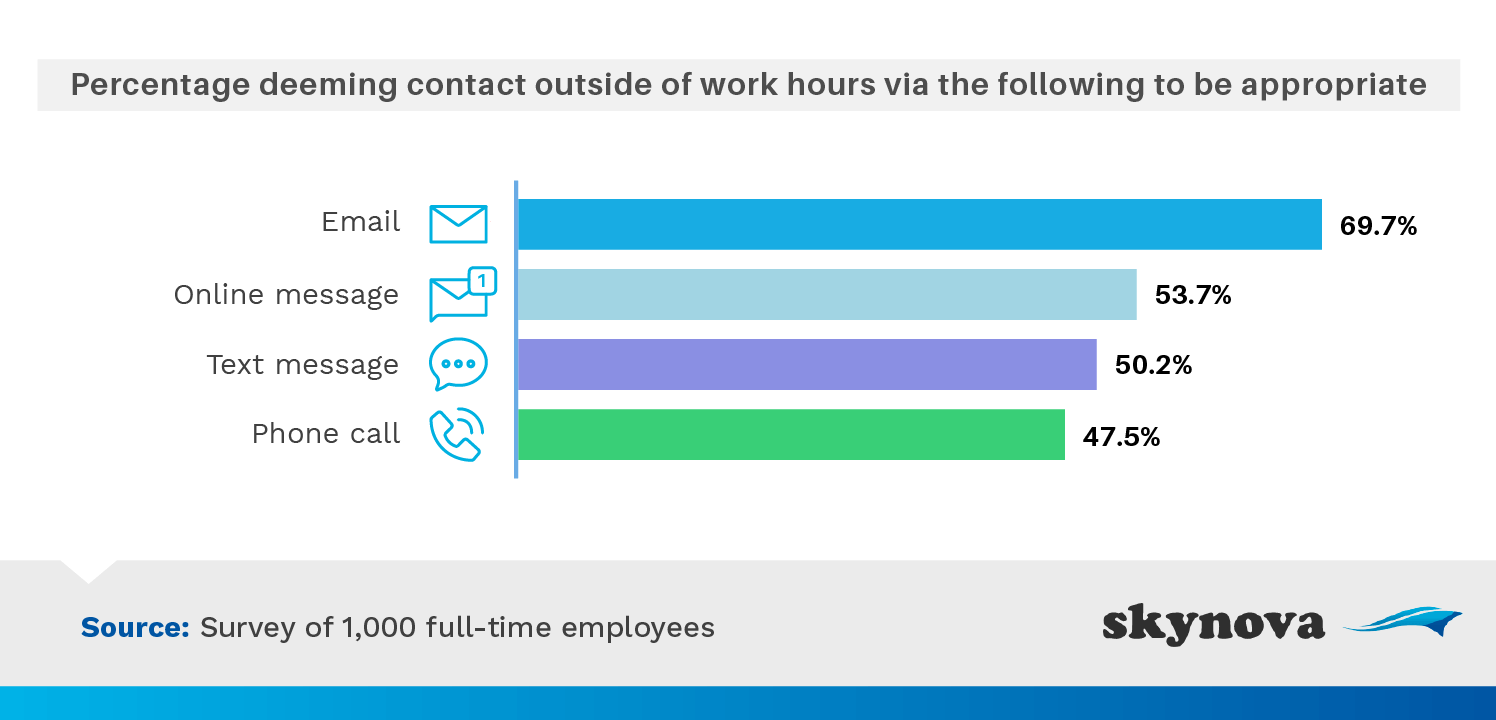
A phone call was perceived as the single most inappropriate way to contact an employee after work. A phone call does suggest the need to speak immediately, and directly, without any indication of how long the conversation will last beforehand. And a call could possibly interrupt dinner, disturb sleep, or infringe on family time. Employees were more likely to rank this type of contact method as inappropriate than any other.
Emails were considered much more acceptable, even among employees who may have felt after-work contact should have been illegal. Only 17.6% of respondents considered an after-work email to be inappropriate, while 12.6% felt ambivalent about it. Emails suggest that a person isn’t required to respond right away and don’t typically come with a loud, lengthy notification. From the sender’s perspective, emails may simply be coming at a time that works best for them to communicate, without expecting anything at all in return.
| Only 17.6% of US respondents considered after-work email to be inappropriate. |
As the U.S. does not currently have laws forbidding employer-employee contact after work, it does happen regularly. This next piece of our study asks respondents to share how often their employers contact them after work, how they respond, and how this affects them overall.
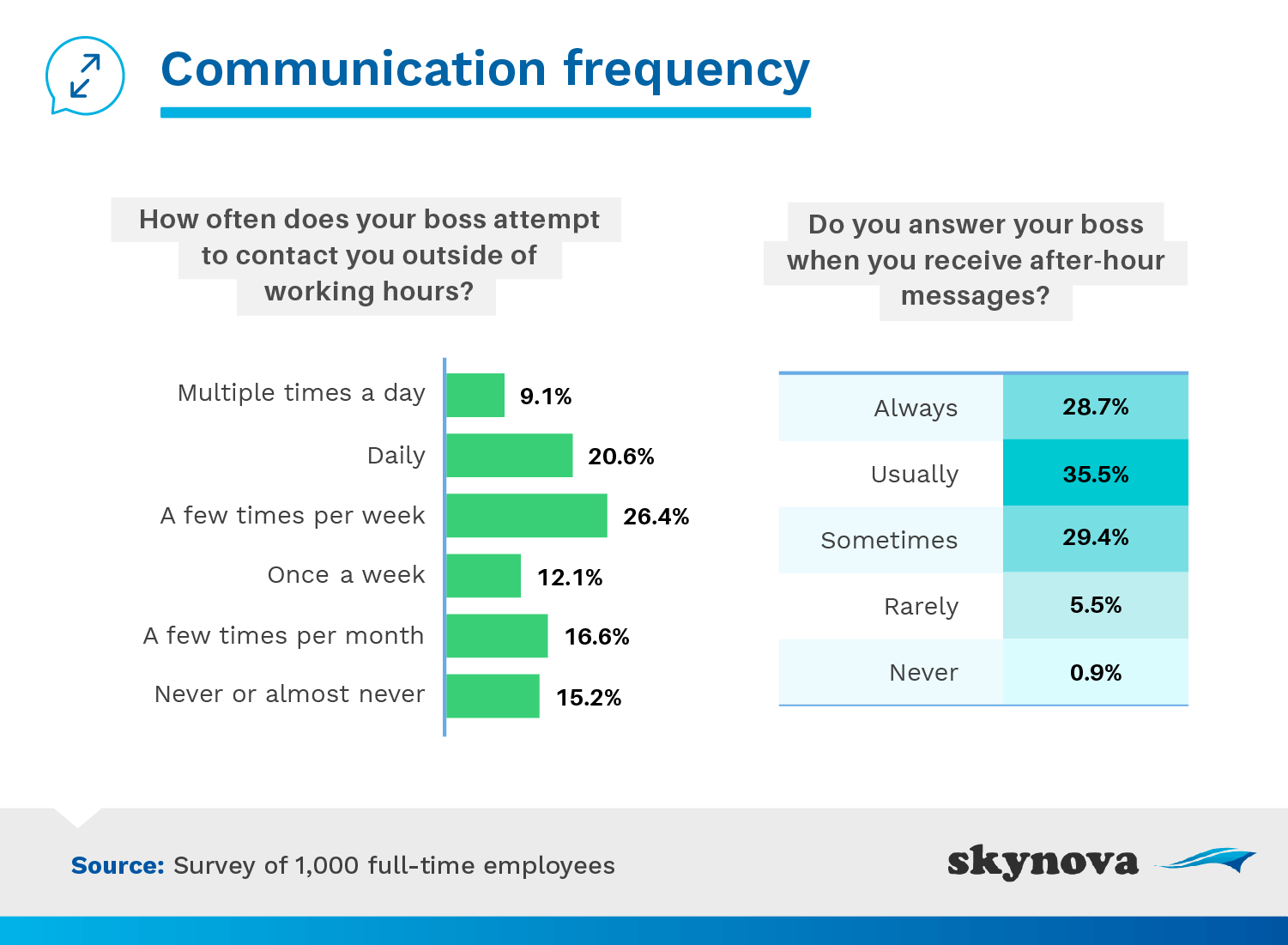
Most employed people in the U.S. are contacted after hours at least once a week by their employers, if not more. More than a quarter reported several weekly outside-of-work contacts, nearly 21% said it happened daily, and about 9% had to deal with it multiple times each day. There was clearly enormous pressure to respond to these outside-of-work calls. Fewer than 7% of those who had been contacted outside of work were able to say that they rarely or never answered, and more than 84% said these after-work calls led to doing more work.
With so many employees admitting to communicating and working with their bosses after hours, we wanted to next dig into a few of the factors prompting the extra work.
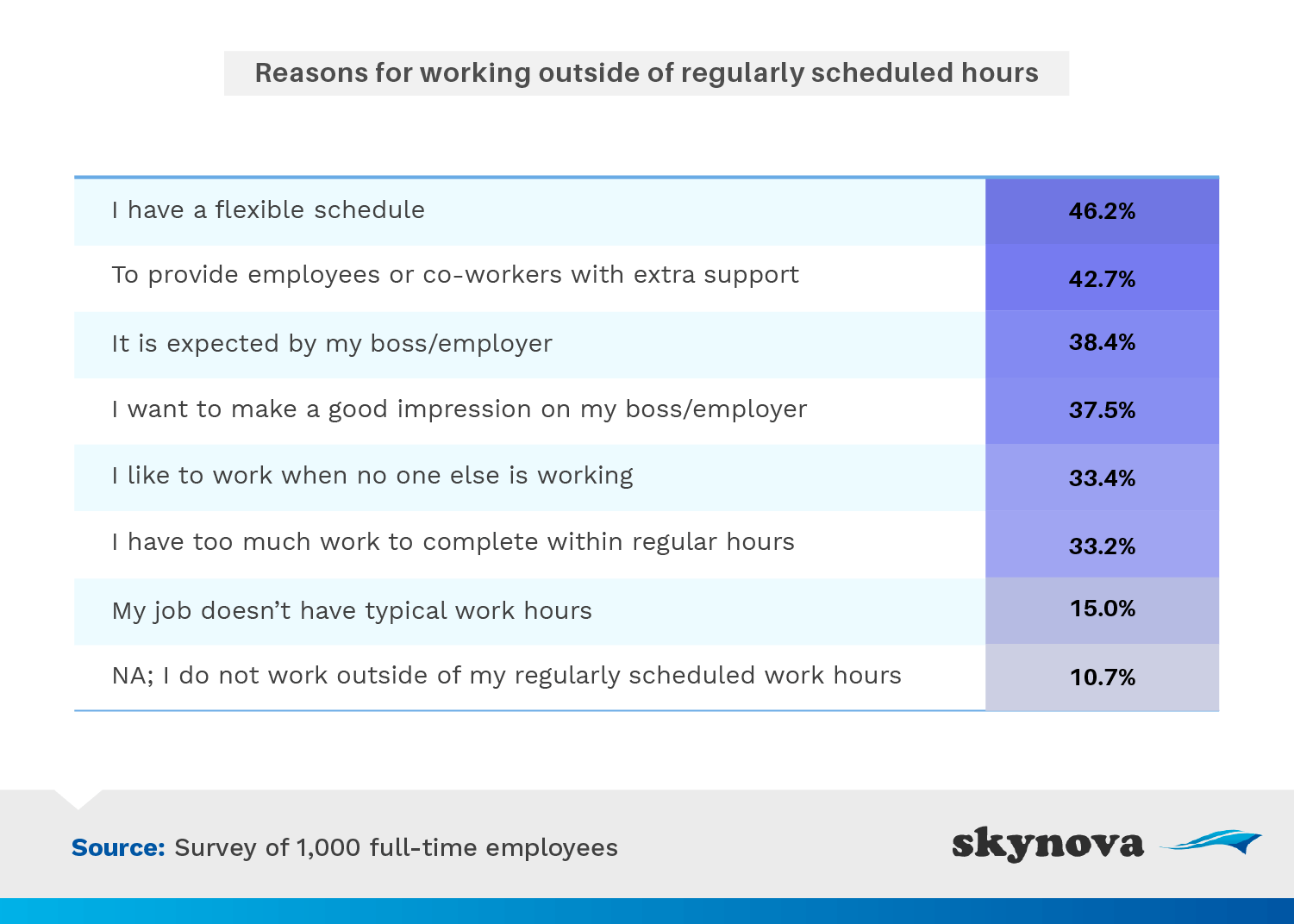
People were highly accommodating, as the No. 1 reason for working beyond regular hours was that their schedules were flexible, and they could adapt to the extra hours. Another 42.7% just wanted to provide their team with extra support. Perhaps this was out of genuine selflessness, but 37.5% admitted to wanting to make a good impression on their employer.
Lastly, we asked our respondents to consider the opposite perspective. Even among those who feel the after-hours contact should be illegal, are there times when it’s OK to receive contact from a superior once the working day is done?
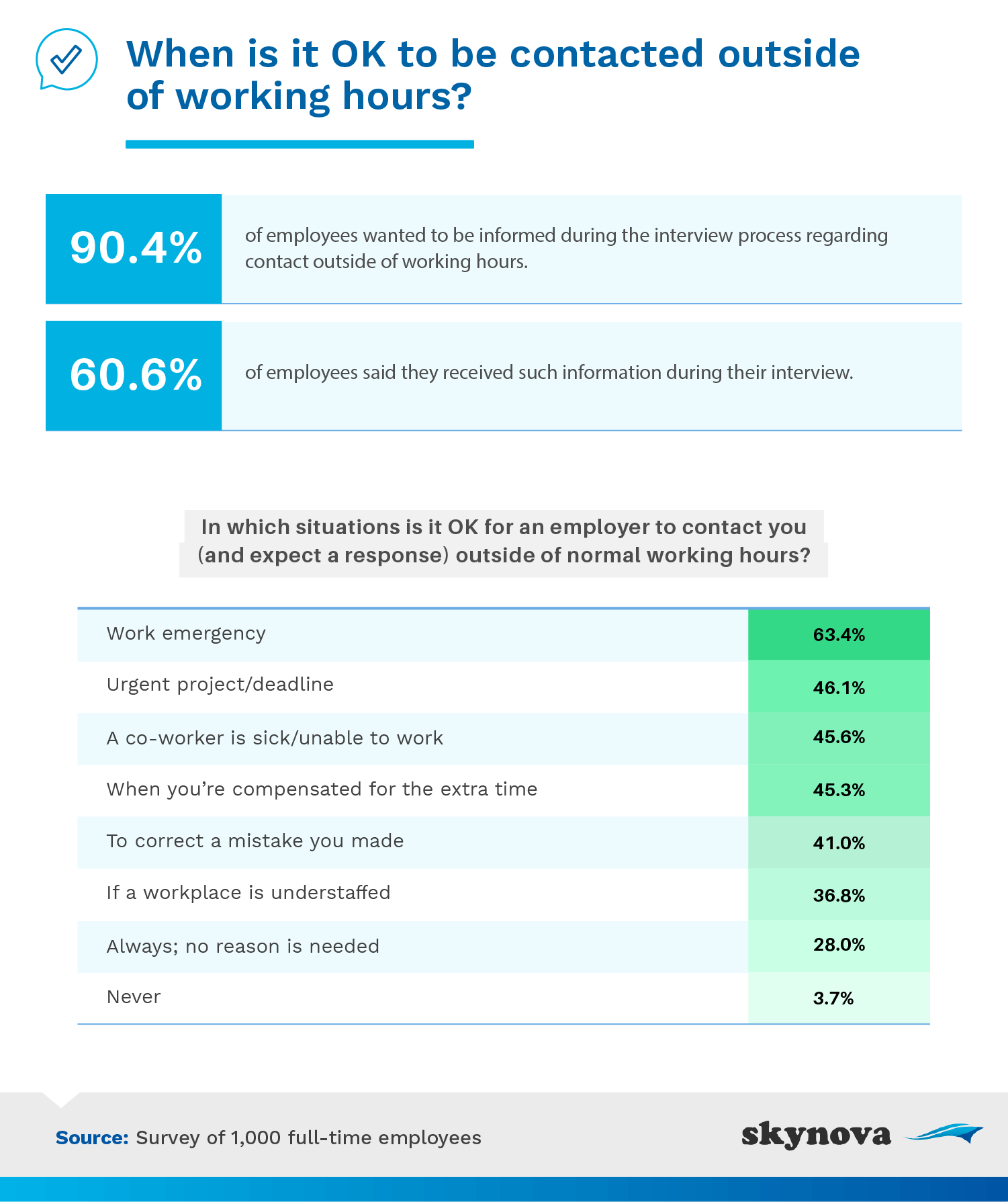
Mostly, employees just wanted the heads-up in order to feel after-hours work was acceptable: 90.4% felt the expectation for receiving this type of communication should be made clear during the interview and/or onboarding process. That said, only 60.6% could recall receiving this initial heads-up.
The most acceptable reason for an after-work call was a work-related emergency. According to the U.S. Department of Labor, a work emergency is an "unforeseen situation that threatens your employees, customers, or the public; disrupts or shuts down your operations; or causes physical or environmental damage." Sixty-three percent of employees were OK with receiving communication post-work in these situations. But for most, urgent deadlines or even extra compensation were not deemed reason enough to call once the working day was over.
Skynova.com dedicates itself to a singular purpose: Help small businesses get paid faster by simplifying and speeding up the billing process. We have tried to keep this in focus when building all parts of our web application, from signing up to creating an invoice, sending it, and your customer paying it. In theory, you should be able to do the entire process in no more than five minutes.
This study uses data from a survey of 1,000 full-time employees located in the U.S. Respondents were presented with a series of questions, including attention-check and disqualification questions. 54.6% of respondents identified as men, while 45.4% identified as women. Respondents ranged in age from 31 to 71 years old with an average age of 48. 38% of respondents worked in a managerial position, while 62% worked in a non-managerial level. 21.3% of respondents were Gen Zers, 33.1% millennials, 34.2% Gen Xers, and 11.4% were baby boomers. Participants incorrectly answering any attention-check question had their answers disqualified. This study has a 3% margin of error on a 95% confidence interval.
Please note that survey responses are self-reported and are subject to issues, such as exaggeration, recency bias, and telescoping.
You are welcome to share this research. Just be sure your purposes are noncommercial and that you link back to this page.